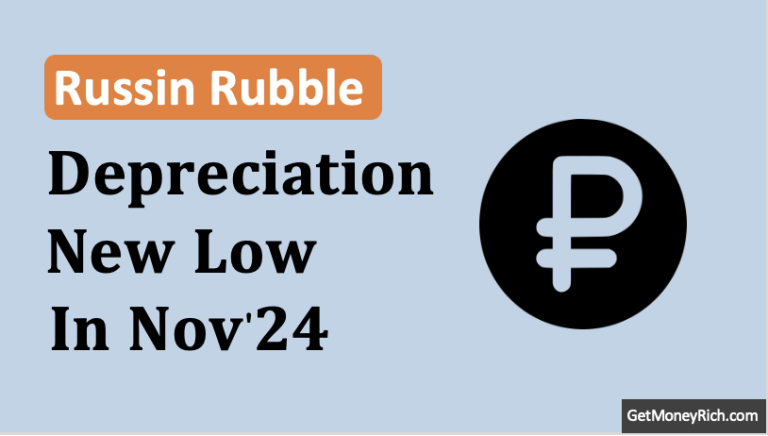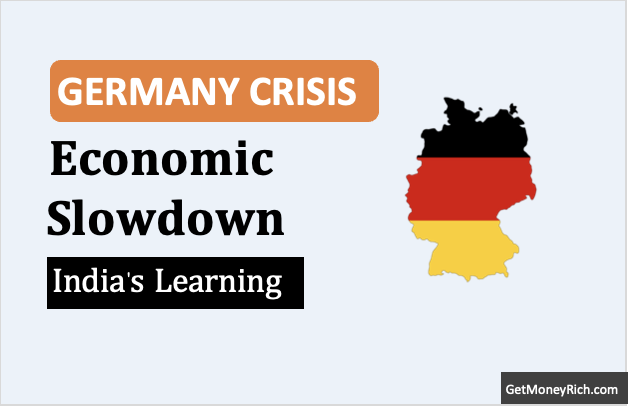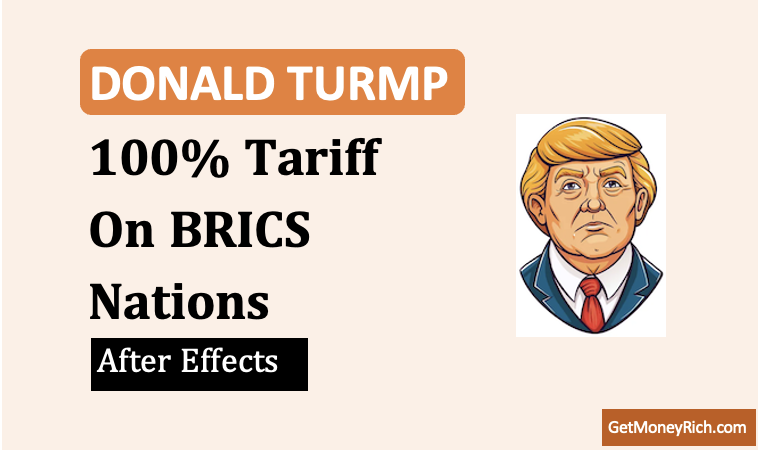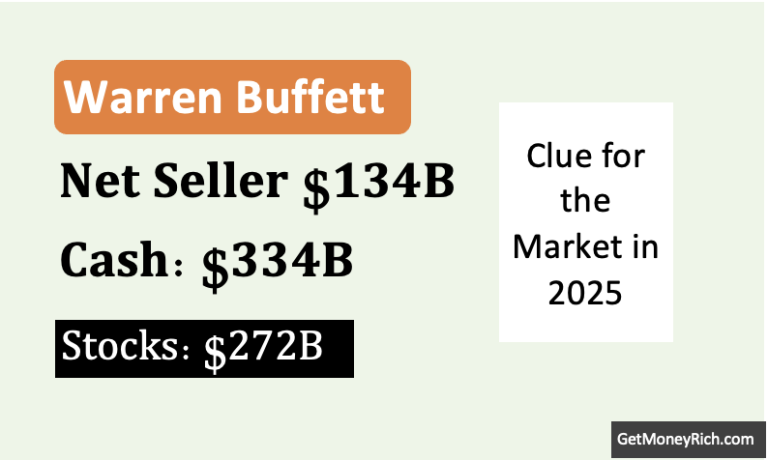Alright, let’s have a chat about something that’s been nagging us lately the USD. Yep, the good ol’ American dollar. It’s that global powerhouse we’ve all come to lean on. What happens if it starts to wobble? I mean, it’s not a crazy thought. You’ve probably caught some unsettling headlines about trade wars heating up again You must also have overheard someone muttering about countries sidestepping the dollar for something like the Yuan or Euro. It’s enough to make anyone wonder: How do I keep my money safe if the dollar decides to take a little vacation from being king?
Don’t worry, I’ve got your back. Let’s walk through this together, figure out what’s going on, and talk about some real, practical ways to hedge your bets. I think, we need not panic. We must at least start discussing the ways out.
So, picture this, you’re sipping your morning coffee, scrolling through the news, and bam, another article about the US economy hitting a rough patch or the national debt climbing higher than your neighbor’s oak tree. It’s natural to feel a little jittery.
I’m not here to tell you the sky’s falling, honestly. I don’t think it is, but I do think it’s worth being ready for whatever comes.
Smart investing isn’t about crossing your fingers and hoping everything stays rosy; it’s about having a game plan for the curveballs. So, let’s dig into what might shake the dollar’s throne and then figure out how to protect what you’ve worked so hard to build.
Table of Contents
1. Why the Dollar Might Stumble
Before we get into the “what can I do” part, let’s chat about why the dollar might even wobble in the first place.
It’s not like one day it’s fine and the next it’s toast, there’s usually a mix of stuff brewing behind the scenes.
Maybe the US economy slows down a bit. Think higher unemployment or businesses not growing as fast as they used to. If that happens, investors, who are a jumpy bunch, might start doubting the dollar’s strength. Or how about those trade wars we keep hearing about? If other countries slap tariffs on American goods, it could ding our exports, and that’s not great for the dollar either.
Then there’s this buzz about some nations flirting with other currencies for their big trades. Imagine Russia or China saying, “Eh, we’ll use the Yuan instead.” If that catches on, fewer people need dollars, and demand drops. Oh, and don’t get me started on the US national debt, it’s a number so big it’s hard to wrap your head around.
Just to give you a perspective of how indebted United States is compares to other major economies, here is a comparison table:
| SL | National Debt | GDP (USD Trillions) | Debt % of GDP |
|---|---|---|---|
| 1 | United States | $27.72 | 124% |
| 2 | United Kingdom | $3.38 | 100% |
| 3 | Germany | $4.53 | 63% |
| 4 | France | $3.05 | 109% |
| 5 | Canada | $2.14 | 106% |
| 6 | Italy | $2.30 | 138% |
| 7 | Australia | $1.73 | 49% |
| 8 | China | $17.79 | 85% |
| 9 | India | $3.57 | 83% |
| 10 | Brazil | $2.17 | 85% |
When the debt keeps ballooning, folks start whispering about whether the US can keep things together long-term.
And inflation? Yeah, that’s still a thing. Even though the Fed’s on it, if prices keep creeping up, the dollar doesn’t buy as much as it used to.
It’s not one single boogeyman, it’s more like a combo punch that could soften the dollar’s grip. Alternative for dollar in world trade, national debt, inflation, etc can potentially weaken the US dollar.
Does that sound overwhelming? It can feel that way, but here’s the good news, you don’t have to just sit there and watch.
There are moves you can make to cushion the blow if the dollar stumbles. Let’s talk more about the solution part it.
2. Hedging Your Bets: Real Stuff You Can Do
Alright, so you’re nodding along, maybe feeling a little antsy about your savings or that investment account you’ve been nurturing. What can you actually do? I’ve got some ideas, practical ones you can chew on and tweak to fit your life. Let’s dive in.
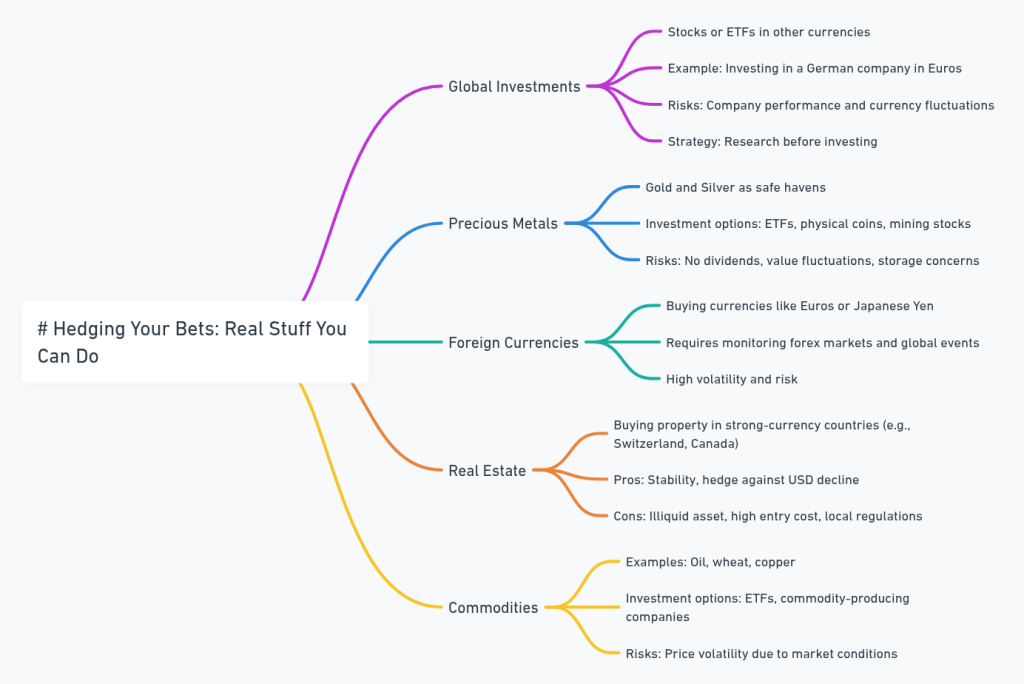
2.1. Global Investments
First up, how about going global with your investments? I’m talking about stocks or ETFs that trade in other currencies. Picture this, you snag some shares in a solid German company, priced in Euros. If the dollar takes a dip against the Euro, those shares could be worth more when you cash them back into dollars. Pretty neat, right? I did something like this a while back, dipped my toes into a European ETF, and it felt good knowing I wasn’t totally tied to the USD’s fate.
But here’s the catch: it’s not foolproof. That German company could hit a rough patch, or the Euro itself could tank. It’s like you’re juggling two risks, the stock and the currency. So, don’t just jump in blind. Peek under the hood, see what you’re buying, and make sure it vibes with your comfort zone.
2.2. Accumulate Precious Metals
Now, let’s talk about the classics, gold and silver. You’ve probably heard people call them “safe havens,” and there’s some truth to that. When the dollar’s shaky, folks (even countries) tend to pile into precious metals, and their prices climb. You can see, how much gold countries have accumulated over years:
| Country | Gold Reserves (Tonnes) | Gold Reserves (USD Bn) |
|---|---|---|
| United States of America | 8,133.46 | 682.28 |
| China | 2,279.56 | 191.22 |
| Switzerland | 1,039.94 | 87.24 |
| India | 876.18 | 73.5 |
| Japan | 845.97 | 70.96 |
| Thailand | 234.52 | 19.67 |
| Singapore | 219.96 | 18.45 |
| Brazil | 129.65 | 10.88 |
| Mexico | 120.3 | 10.09 |
| South Korea | 104.45 | 8.76 |
Source: World Gold Council
You could grab a gold ETF, pick up some physical coins (I’ve got a few stashed in a safe, it’s kind of fun to hold), or even invest in a mining company.
But here’s the flip side: gold doesn’t send you a dividend check (it generates no income). It just sits there, and its value swings based on what people think it’s worth. Plus, if you go the physical route, you’ve got to figure out where to keep it. My buddy learned that the hard way when he realized his “secure” spot wasn’t so secure.
It’s a trade-off, but it’s worth thinking about if you want a buffer.
2.3. Foreign Currencies
Feeling a bit bolder? You could try buying foreign currencies outright, like Euros or Japanese Yen.
It’s a little like playing the stock market but with money itself. You’d use a broker or your bank to swap some dollars for another currency, betting it’ll hold up better.
I’ve got a friend who’s into this, he’s always glued to forex charts, and he swears by it. But man, it’s a rollercoaster. Currency values bounce around like crazy. You’ve got to keep an eye on everything from elections to oil prices.
If you’re new to this, it might be a lot to swallow, but it’s an option if you’re up for the adventure.
2.4. Real Estate
What about real estate? I’ve always thought owning property in a place with a strong currency, like Switzerland or Canada. Sounds appealing, right?.
It’s a way to park your money somewhere stable, and if the dollar slips, you’re still sitting pretty in, say, Canadian dollars.
The downside? It’s not like selling a stock, issue can be the liquidity. You can’t just offload a house overnight. And it takes a decent chunk of cash to get started. Plus, local markets have their own quirks.
A colleague of mine bought a rental up in Toronto, and while it’s worked out, he’s had to deal with regulations he didn’t expect.
It’s a slow-and-steady play, not a quick fix.
2.5. Commodities
And don’t sleep on commodities. Beyond gold, there’s oil, wheat, copper, stuff the world runs on.
When inflation bites or the dollar weakens, these can hold their own. You could grab a commodity ETF or back a company that drills or grows the stuff. Just know it’s a wild ride, prices can spike or crash based on things like weather or shipping hiccups.
I dabbled in an oil ETF once, and it was a nail-biter, but it balanced out some of my other worries.
3. Important Considerations
Okay, before you run off to try any of this, let’s hit pause and talk about the real-world side of things.
- First off, how much risk can you stomach? Some of these ideas, like currency trading, are spicier than others. I’m a “sleep at night” kind of person, so I lean toward safer bets, but you do you. And please, don’t just take my word for it, dig into whatever you’re eyeing. Research is your best friend here. I learned that lesson when I almost jumped into a sketchy fund without checking the fine print.
- Better yet, grab a coffee with a financial advisor. They can look at your whole picture, your goals, your savings, your “what keeps me up at night” list, and tailor something just for you. Oh, and taxes, I know. If you’re investing overseas, Uncle Sam’s still got his hand out, so figure out what that means for you. My accountant saved me a headache on that one.
- Here’s a biggie: don’t bet it all on one horse. Spread your money around, some stocks here, a little gold there, maybe a property down the line. It’s like packing for a trip: you don’t just bring flip-flops in case it snows.
- And do not forget to think about timing. Are you bracing for a short dip or a long slide? That’ll shape what makes sense for you.
Conclusion
So, yeah, worrying about the dollar’s future?
Totally normal. I’ve had those moments too, staring at my bank account wondering what’s next. But here’s the thing, freaking out won’t help.
What will? Taking a deep breath, doing your homework, maybe chatting with someone who knows their stuff, and building a plan that feels right for you.
Hedging isn’t about striking it rich, it’s about keeping your head above water if the tide turns. It’s about knowing you’ve got options, so you can kick back and enjoy your coffee instead of doom-scrolling the news.
You’re smart to think about this now. Whatever happens with the dollar, you’ll be ready, not just hoping, but prepared.
So, what do you think? Where are you leaning? Let’s keep this conversation going, I’m all ears.
Have a happy investing.


